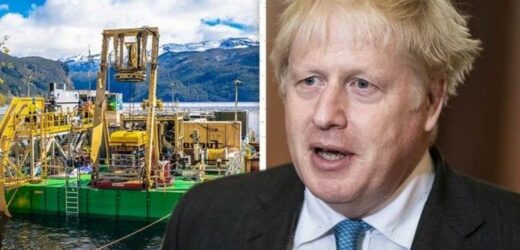Gas prices: Putin ‘going to keep squeezing’ says expert
We use your sign-up to provide content in ways you’ve consented to and to improve our understanding of you. This may include adverts from us and 3rd parties based on our understanding. You can unsubscribe at any time. More info
The 450-mile-long North Sea Link is the world’s longest undersea power cable and it has just gone online. Stretching from Northumberland to Norway, the project is set to fight climate change by cutting down on carbon emissions and customers’ bills. Starting on Friday, the pair of cables running along the floor of the North Sea will carry up to 700 megawatts of power.
The capacity will double over the next three months and at peak output will power as many as 1.4 million UK households.
Cordi O’Hara, president of National Grid Ventures, said: “North Sea Link is a truly remarkable feat of engineering.
“We had to go through mountains, fjords and across the North Sea to make this happen.”
Experts estimate the £1.37billion (€1.6billion) project will slash the UK’s carbon emissions by an impressive 23 million tonnes by 2030, by reducing the national grid’s need to burn fossil fuels when wind and solar output drop.


Norway is a world leader in the field of renewables, generating more than 90 percent of inland electricity from hydropower.
National Grid has hailed the North Sea Link a “major milestone” in the UK’s push for net-zero by 2050.
North Sea Link also marks the National Grid’s fifth interconnector to Europe, including links to Belgium, France and the Netherlands.
By 2030, 90 percent of the electricity imported by National Grid will be from carbon-free sources, saving the UK some 100 million tonnes of carbon emissions – the leading cause of global warming.
Greg Hands, UK Energy, Clean Growth and Climate Change Minister, said: “The UK has a strong energy bond with Norway that goes back decades. North Sea Link is strengthening that bond and enabling both nations to benefit from the flexibility and energy security that interconnectors provide.
“As we prepare to host the UN COP26 summit, this pioneering partnership shows first-hand how crucial international cooperation will be in helping us to deliver on our net-zero ambitions and provide clean renewable energy to millions of UK homes.”
Kwasi Kwarteng says gas prices are ‘global issue’
The connection could also play a major role in helping the UK avoid Europe’s brewing energy crisis.
With reserves of natural gas dwindling and renewable supplies struggling to keep up with demand, experts fear Europe may be left in a vulnerable position this winter.
Europe’s reliance on Russia for coal and gas has also been growing in recent months, triggered by a shortage of resources.
The Kremlin has been accused of strategically limiting the flow of gas into Europe to gain political leverage against the bloc.
Natural gas suppliers in recent months have been favouring the Asian markets where there is a growing appetite for energy.
The gas crisis has even affected the UK this month, causing nine small energy suppliers to go bust.


But with North Sea Link in the mix, the UK is set to import electricity at times when demand is low but output from wind is low.
At the same time, when wind output is high and demand is low, the UK will be able to export the electricity back to Europe.
The UK Government has committed to a green transition by 2050 and that means phasing out gas and coal from the power grid.
Gas boilers, in particular, are estimated to produce twice as many greenhouse emissions as all of the nation’s gas-fired power stations combined.
According to a report published by the climate charity Possible, gas boilers also produce eight times as much nitrogen oxide (N02) as power plants.
It is estimated gas boilers contribute about 14 to 15 percent of the nation’s greenhouse gas emissions.
Plans are now in motion to phase out gas and oil boilers in favour of heat pumps before the net-zero target.
Industry insiders have recently revealed up to five million households could face a £2,500 bill when installing heat pumps – a green alternative to gas boilers.
According to a report by the Heating and Hot Water Industry Council (HHIC), the Government’s plans could cost up to £12.5billion.
Last year, Prime Minister Boris Johnson said the Government will look to install 600,000 heat pumps a year by 2028.
Source: Read Full Article


